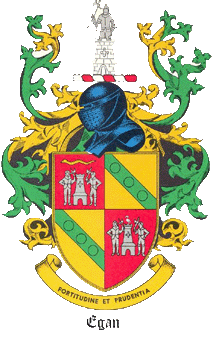
The
MacEgan, Egan, Eagan, Eagen,
Agen, Agin, Agins, and Keegan Families
|
The
MacEgan, Egan, Eagan, Eagen, |
The most commonly used measure of difference between your DNA and that of someone else is how many markers (Alleles) are different. This is a simple count and does not take into account what can actually happen. In practice more than one marker can change in a generation and some markers change more rapidly than others. The more markers you have in yours and the candidate relatives the greater the confidence you may have in the TMRCA estimate.
It is possible to do a little mathematics to calculate how far back in time, in terms of the number of generations, two people may have a common ancestor. This is called the time to most recent common ancestor (TMRCA). To do this, we assume any number of markers, not just one, can change within one generation (Infinite Alleles), and we use the probability (mutation rate) that a specific marker will change.
In our case the mathematics to perform the analysis has been done and is incorporated
in the Distance Calculator on the McGee
Family Surname Site. The options we have chosen are Infinite Alleles and
the FTDNA mutation rates. If you are interested, you can read the paper by Bruce
Walsh entitled Estimating
the Time to the Most Recent Common Ancestor for the Y chromosome or Mitochondrial
DNA for a Pair of Individuals.
Top
Clann Mac Aodhagáin | Clann
Mac Aodhagáin Australia & New Zealand
Copyright © 2000-2019 Clann
Mac
Aodhagáin Association (Australia & New
Zealand)- All rights reserved. Last updated April 2019.